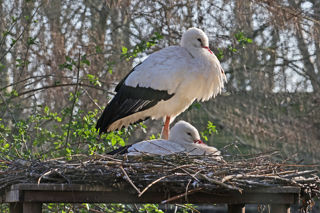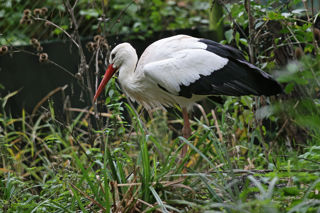
White Stork
Ciconia ciconia
This is a large, unmistakable bird standing around 1-1.5m tall. It has a classic stork appearance with long slender legs, neck and long pointed bill. The legs and bill are bright orange. The plumage is white, with black flight feathers on the wings. The wingspan of this bird is around 1.5-2m.
Behaviour
They flock together; very large flocks seen in Africa during the winter compared to the smaller breeding colonies that form when pairs feed and nest together.
They communicate to each other with loud bill clattering (rapid opening and closing of the beak) and low hissing sounds.
Nests are constructed of sticks and branches, normally high above the ground (in trees, houses and on telegraph poles).
UK Status
Prior to 2019, the last breeding pair in the UK was recorded in 1416. In 2019, twenty four juvenile storks were released at Knepp Estate in Sussex as part of a reintroduction project, and since then the species has once again been breeding successfully in England.
Threats
Declined across Europe due to habitat loss (wetland drainage, industrialisation, dam creation), hunting (mainly during their migration in Europe), collision with power cables and excessive use of pesticides.

Distribution
Historically has had a wide distribution throughout Europe and Asia. Has become reduced in recent years. Still found clustered in large populations in much of central and eastern Europe (Poland is home to 25% of the world’s population), heading to Africa for the winter.
Habitat
Open grasslands, farmlands, shallow marshes, and rice-fields are preferred over woodlands or shrub land for breeding. Scattered trees within these open areas are needed for roosting opportunities. During the winter, they tend to inhabit much drier areas.
Diet
Varied carnivorous diet. Small mammals (such as voles, mice, shrews and rats), large invertebrates (such as beetles and locusts), amphibians, reptiles, birds, eggs and fish are all opportunistically taken.
Family facts
The “bill-clattering” behaviour for communication has been likened to the sound of a machine gun.
According to European myth, white storks deliver babies to new parents in a basket.


